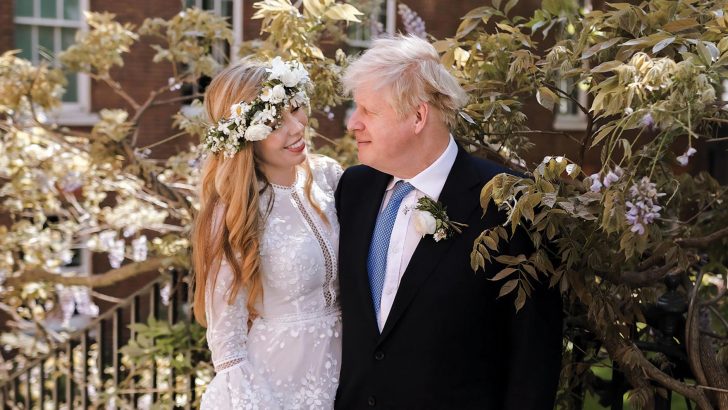Baptism is the key that unlocked the door to a valid Catholic marriage for Boris Johnson, writes Jason Osborne
Social media is a rarely a home to calm, quiet discussion, and the conversation than emerged following the news of Boris Johnson and Carrie Symonds’ wedding was no different. Many expressed outrage at the Church’s seemingly duplicitous handling of the twice-divorced prime minister’s marriage, when the Catholic Church is often toted as the sole bulwark of permanent marriage in the western world.
An English priest summed up this camp’s sentiment on Twitter when he asked: “Can anyone explain to me how Boris Johnson, who left the Catholic Church while at Eton and is twice divorced, can be married at Westminster Cathedral, while I have to tell practicing Catholics in good faith who want a second marriage in Church that it’s not possible?”
Others expressed nothing more than an idle curiosity or wonder at the situation, but regardless, it turned many heads. How could it be that a twice-divorced Anglican with some history of extramarital affairs could pull such an about-turn as to be married in Westminster Cathedral, with the full blessing of the Catholic Church?
What’s more, how can a self-professed Anglican claim the full rights afforded to a Catholic? The key that unlocks all of these doors is Mr Johnson’s Baptism, it turns out. Mr Johnson’s mother, Charlotte Wahl, is a Catholic and had him baptised into the Catholic Church upon his birth. His new wife, Mrs Carrie Johnson (née Symonds) is also a baptised Catholic who never previously married.
Baptised
The couple had their son, Wilfred, baptised into the Catholic Church in September 2020 too, by the same priest who would go on to marry them, Fr Daniel Humphreys.
All entirely Catholic, but critics drew attention to the fact that Mr Johnson was confirmed in the Church of England during his time at Eton College, and that he was divorced from two marriages that had been carried out through institutions other than the Catholic Church, seemingly indicating a lack of engagement with his Catholic faith and obvious obstacles to a Catholic marriage in popular thought.
According to Church law however, to be married sacramentally, both parties must be baptised Christians, with at least one being a Catholic. They must be free to marry, having received instruction in the Church’s understanding of marriage. In this instance, both partners satisfy these conditions, but the question remains as to how, with Mr Johnson’s past.
Institution
While the Church respects the institution of natural marriage (marriages that take place in institutions other than the Catholic Church), Catholics are bound by the form of marriage, which means that they must marry in the Catholic Church.
Mr Johnson’s previous marriages, it is assumed by canonical lawyers who have speculated on the issue, lacked ‘canonical form’ – that is to say, his previous marriages didn’t fulfil the requirements of Church law, and as such, cannot be considered sacramental. As a result, all that would be needed to prove Mr Johnson’s freedom to marry would be a declaration of the invalidity of his previous marriages by the Church, which it is assumed was supplied.
Because Mr Johnson was baptised Catholic, the Church only considers marriages which are conducted by the Catholic Church as marriage in his case. As mentioned, the Church respects the institution of natural marriage, but its particular rule concerning Catholics goes back to the Council of Trent.
In the medieval period, the phenomenon of ‘secret weddings’ arose, which saw two people pronounce consent between themselves and declare themselves married. This was based upon the idea that consent creates marriage, which continues to hold today. However, difficulty arose when one of the parties later decided to deny that the marriage had taken place.
To solve this issue, the Council of Trent decided that although consent creates marriage, from that point onward, Catholics were required to marry before the parish priest and with two witnesses to ensure that the marriage couldn’t be disregarded in the future.
Special treatment
So, far from Mr Johnson receiving special treatment, he is in fact being treated according to the exact same standard as all other baptised Catholics. He is subject to the same universal law as others, and his marriage was free to take place according to technicalities contained within that law. Technicalities, but no tricks.
The Church holds its members to sacramental marriage because that is the Church’s domain. As long as the other marriages a person may have been involved in can be shown to have been invalid, they are as free to marry in the Catholic Church as anyone else is.
On the matter of Mr Johnson’s faith, it is difficult to say whether his Anglican history constitutes formal defection from the Catholic Church as the details of his spiritual history haven’t been made clear to anyone other than those in his closest circle, including Fr Humphreys. However, the fact that the marriage went ahead implies that Mr Johnson’s engagement with the Catholic Faith is sufficient to fulfil the Church’s requirements.
As Catholic commentator and author Austen Ivereigh pointed out however, by virtue of his Baptism, Mr Johnson has as much a right to the Catholic rites as anyone else.


 Boris Johnson and Carrie Symonds pictured in the garden of 10 Downing Street after their wedding. Photo: CNS.
Boris Johnson and Carrie Symonds pictured in the garden of 10 Downing Street after their wedding. Photo: CNS. 